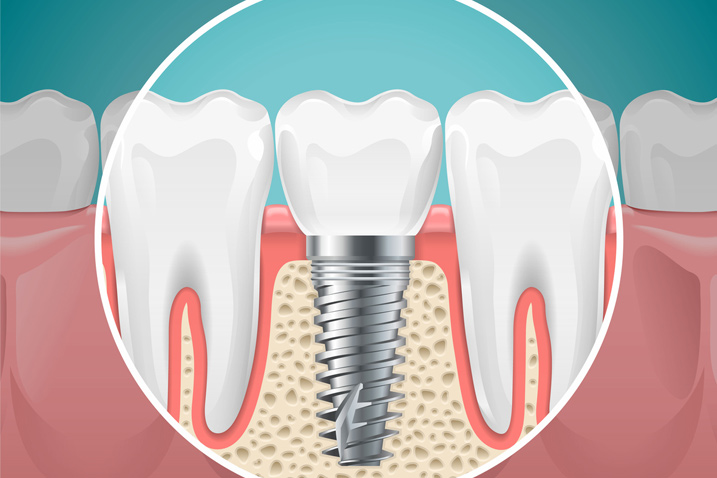
A dental implant offers a strong, natural-looking replacement for a lost tooth. Find out if you’re a good candidate for this safe and effective procedure.
Tooth loss affects millions of Americans, whether it’s due to tooth decay, periodontal disease, or traumatic injury. Regardless of the cause, a dental implant can serve as a replacement for a missing tooth while providing solid support and a natural look.
A dental implant is a metal, screw-like post that is inserted into the jawbone and then capped with an artificial tooth. The implant fuses with the bone over time to become a permanent fixture that won’t slide out of place or damage your natural teeth. This bone fusion makes a dental implant one of the strongest, most enduring options for tooth replacement.
If you’re considering a dental implant, here’s what you need to know — from prepping for the surgery to maintaining your artificial tooth for years to come.
The Benefits of Dental Implants
There are three common options for replacing missing teeth: partial or complete dentures, fixed bridgework, and dental implants. While all of these solutions have their own benefits and drawbacks, dental implants are considered the best option for mimicking the appearance and function of natural teeth.
Implants generally use titanium — a strong metal that our bodies don’t register as a foreign substance — to fuse the artificial tooth to the jawbone in a process called “osseointegration.” This means that dental implants won’t slip, make noise, or cause tooth decay in the way that dentures or fixed bridgework might.
Dental implant surgery is a safe and effective procedure with a success rate of nearly 98 percent. Once the implant has successfully fused with the jawbone, your artificial tooth can last a lifetime. Plus, dental implants are designed to look and feel like your own teeth and can be easily maintained with similar care.
What to Expect During Dental Implant Surgery
Once you and your doctor have determined that a dental implant is right for you, you’ll likely begin the process with a comprehensive dental exam. Your dental surgeon will take X-rays and 3D images of the affected area to create models of your teeth and jaw. You’ll also discuss your medical history, including any pre-existing conditions and prescribed medications you might be taking. Then you and your care team will come up with a personalized treatment plan that takes into account your individual needs.
Dental implant surgery is generally an outpatient procedure that is performed in stages, with time to heal in between treatments. Depending on your preference and the work that needs to be done, you and your doctor may decide on local anesthesia, sedation, or general anesthesia.
The steps of dental implant surgery generally include:
- Removal of the damaged tooth, if necessary.
- Preparation of the jawbone with bone grafting, if necessary. This is usually followed by a healing period.
- Placement of the titanium implant into the jawbone.
- A healing phase that lasts from six to twelve weeks. A “healing cap” is placed over the implant to protect the area as the jawbone fuses around the titanium post.
- Placement of the abutment, which holds the replacement tooth or crown.
- Placement of the artificial tooth, which can be removable or fixed. The crown is generally cemented in place or secured with a screw to the abutment.
From start to finish, the placement of a dental implant can take several months. However, the process may go more quickly for some patients who are able to skip certain steps. Most of your time will be spent waiting for the mouth to heal between phases and the jawbone to grow around the implant.
After each step in the process, you may experience some soreness that can typically be treated with over-the-counter pain medications. Your dental surgeon may also recommend that you stick to soft foods as the area around your implant heals.
Are Dental Implants Right for You?
If you’re considering dental implants, there are a few criteria you’ll need to meet. You should have relatively healthy gums, a jawbone that’s reached full growth, and enough bone to secure the dental implant. You should also be willing to commit several months to the process. Finally, in order for your dental implant to remain in good condition for the future, you should not smoke or chew tobacco.
Otherwise, most patients who are healthy enough to have a tooth extraction or oral surgery are able to get a dental implant. To find out if this procedure is right for you, set up an appointment at Espire Dental today. Our experienced dentists and oral surgeons will help you come up with a personalized treatment plan that meets your needs and keeps your smile looking fresh and natural for years to come.


